Is It Good If Pigeon Laying Eggs in My Balcony?
Have you seen pigeons laying eggs on the balcony? Is it good if pigeons lay eggs on your balcony? No, it isn’t, and you need to start thinking about how to get it out.
Not only are pigeons’ droppings extremely dirty, but they also carry a host of diseases that are transmissible to humans. And once a pigeon gets comfortable with using your balcony, it will return over and over again.
You must not think that we’re animal haters or that we would suggest harming an innocent family of pigeons. And for many city dwellers, it won’t come as a surprise to learn that pigeons love to nest in high-rise balconies.
However, it’s in your best interest to remove the nest and the pigeon family as soon as you can.
Looking for more articles about pigeon fun fact:
What Kind of Environment Does a Pigeon Need to Lay Eggs?
In comparison to other species of birds, pigeons’ nests are quite rudimentary.
Usually made from small twigs and whatever other materials the pigeon can find, the nests usually hold no more than 2 eggs at a time.
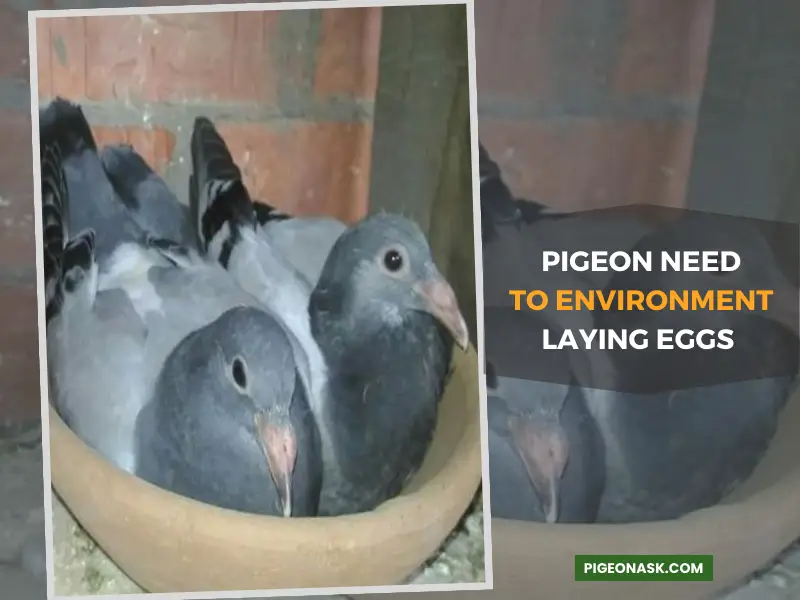
Pigeons were domesticated by humans around 10,000 years ago. They prefer to make nests on the edges of cliffs; however, it goes without saying that many metropolises don’t offer this kind of location.
So, the pigeons opt to build their nests in high-rise buildings, which to them look similar to cliffs where their eggs will remain safe, high up and away from land predators.
However, while this is understandable, it is also a cause for concern.
What Does It Mean When Pigeons Lay Eggs on a Balcony?
Has a pigeon nested on your balcony? That means your balcony was found to be a safe and comfortable space to lay eggs by pigeons.
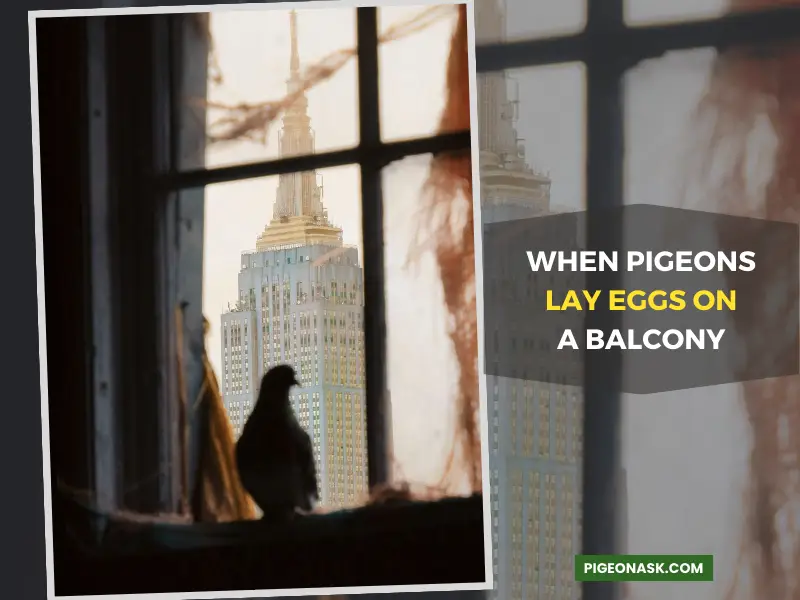
While this is heartwarming, the best thing to do if you find a pigeon’s nest on your balcony is to get rid of it (unless it already has eggs or babies in it).
As we mentioned above, pigeons bring with them severe health hazards that can be harmful to both you and your loved ones.
We have covered an in-depth article on “Pigeon Fun Facts“; if interested, you can check this article here.
How to Get Rid of Pigeon’s Nest Safely?
You need to handle the nest safely, as you don’t want the germs to get onto your hands.
So, never touch a pigeon’s nest with your bare hands. First, get a pair of gloves, and then, wearing the gloves, remove the nest from your balcony.
But before removing the nest, check if there’s egg in it. If there’s egg in it, then let the nest remain until the eggs have hatched.
If there’s no egg, you can then throw the nest into the garbage bin, as throwing it out in an open space can cause issues for other people. If you wish to discourage the mother from returning to your balcony, place a toy snake where you found the nest.
This will hopefully scare the bird and prevent it from coming back. Find more tips on how to keep pigeons away from your balcony below.
Is It Bad for Pigeons to Breed in Someone’s Home?
Yes. As mentioned above, pigeons – especially those that live in a city – carry with them a few very harmful diseases.
Although they are undoubtedly cute and turning them away from a possible nesting spot seems mean, pigeons are not the kind of animal you should be treating as pets, specially if you have no experience with pigeons before.
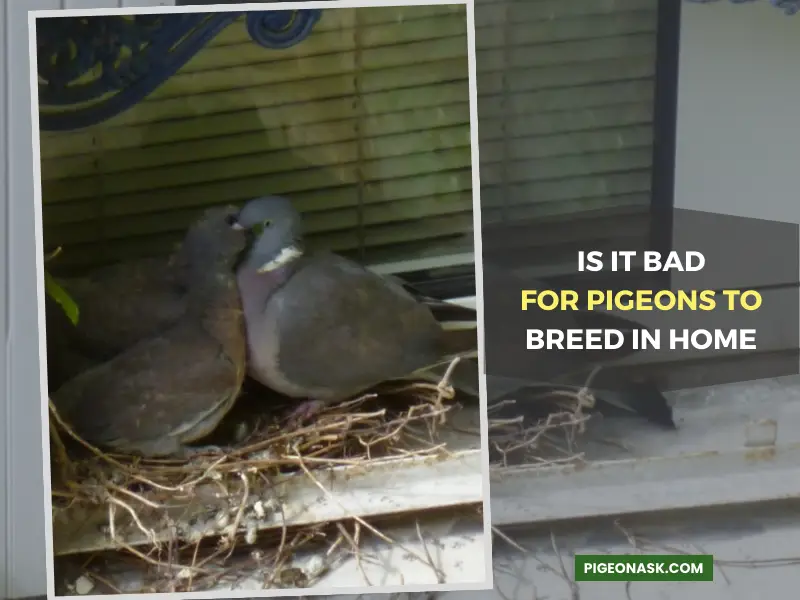
And, of course, pigeons are known for being very messy. They defecate frequently and are known for their yucky droppings.
But it’s not just that pigeon droppings are disgusting; they are also corrosive and can significantly damage roofs and balconies.
Plus, it is also very difficult to scrap pigeon droppings from floors. This is undesirable as pigeon droppings tend to leave a stain if not cleaned in time.
Furthermore, pigeon droppings can attract rats and flies.
Finally, pigeons tend to return from season to season, which makes it quite difficult to chase them away.
What Kind of Problems Can a Pigeon’s Eggs Cause?
There are three main diseases associated with pigeons that are dangerous for humans: Cryptococcosis, Histoplasmosis, and Psittacosis.
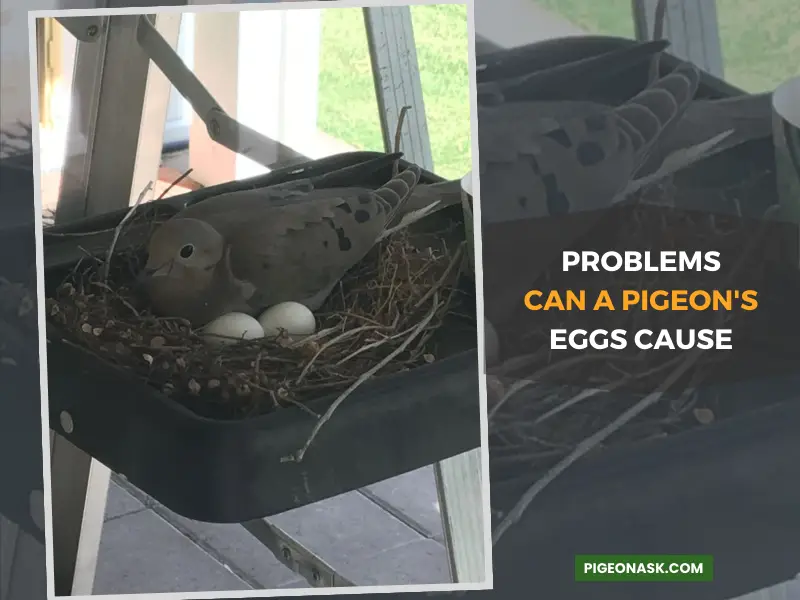
Let’s have a closer look at each in turn.
Cryptococcosis
Cryptococcosis is a disease caused by the fungus Cryptococcus Neoformans.
Typically found in soil, unwashed fruit and pigeon droppings, this disease primarily affects the lungs.
While the disease can be transmitted between individuals, healthy people often show no symptoms. However, those with weakened immune systems face a greater risk of contracting it.
So if you have elderly or infants in your family, it’s double bad news if a pigeon nests in your balcony.
While the infection predominantly targets the lungs and may present few symptoms, in rare instances, it can extend to the brain, urinary tract, and bones. If it reaches the brain, it can result in meningitis and other serious complications.
Histoplasmosis
Bird droppings, including pigeon droppings, can be a source of the fungus called Histoplasma capsulatum. This causes Histoplasmosis, a disease that results from inhaling spores of the fungus.
While most individuals don’t exhibit symptoms of Histoplasmosis, the disease poses a threat to those with weakened immune systems, including infants and the elderly.
Although many don’t show signs of the infection, in severe cases, symptoms like high fever, chest pains, and fatigue emerge.
A chronic version of Histoplasmosis can cause a bloody cough resembling tuberculosis symptoms. If not addressed, this condition can be life-threatening.
Psittacosis
Also known as Parrot Fever or Ornithosis, Psittacosis is a disease caused by the fungus Chlamydia Psittaci, which is usually present in bird droppings.
This is why pet shop owners, aviary workers and vets are usually seen being affected by this disease.
In humans, symptoms include fever, chills, severe headache, muscle aches, fatigue, cough, breathing difficulties, chest pain, nausea, vomiting, diarrhea, and in severe cases, mental confusion.
The severity of the disease can vary, with some individuals showing mild symptoms or none at all, while others can develop severe pneumonia.
How Can I Stop a Pigeon from Laying Eggs on My Balcony?
Of course, no one wants to hurt innocent pigeons by moving their eggs or nests. If the pigeon has already laid eggs, then let them hatch (which takes two weeks). Otherwise, the baby pigeons will die.
The good news is that pigeon babies grow very fast; within a little over three weeks, baby pigeons are usually ready to fly.
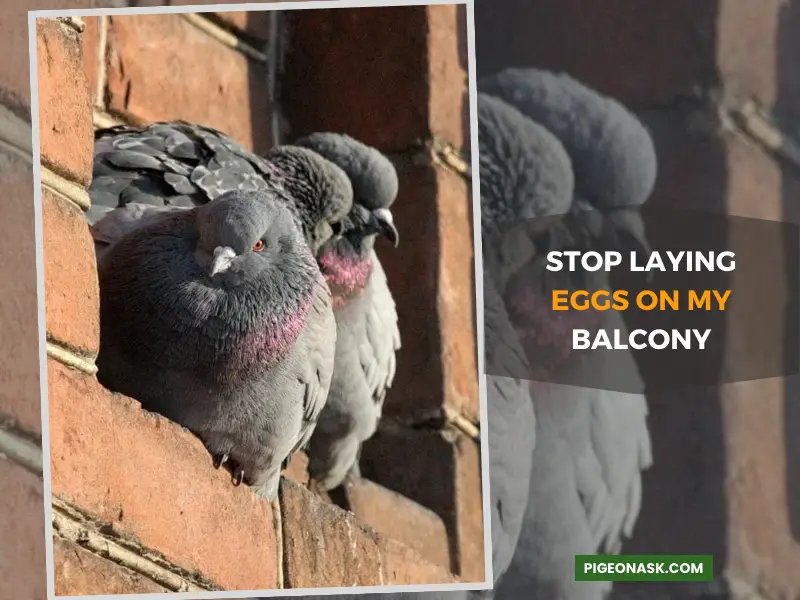
However, the mom pigeon will most likely be getting ready to lay another pair of eggs by this time. This is what you want to avoid.
Here are some tips on how to scare pigeons off your balcony and prevent them from nesting there again –
- Repeatedly approach the pigeons in order to make them uncomfortable and shoo them away. This, in turn, will obstruct their process of breeding.
- If you notice the pigeons bringing new nesting materials onto your balcony, throw the materials away. This will cause the pigeons to feel unsafe nesting there.
- Change the appearance or layout of your balcony so as to make it unfamiliar to the pigeons. Try to make available surfaces uncomfortable for any pigeons to alight on.
Prevention Tips for Preventing Pigeons from Entering the Balcony Again
Here are some steps you can take to stop the pigeons from entering the balcony again.
Add a Net: Once the pigeon babies have flown away, place a net around the balcony to prevent the pigeon family from coming inside.
However, it’s essential that pigeon netting be professionally installed and regularly maintained! If the netting becomes loose and floppy, it can be very dangerous to other birds that might fly into it and get tangled up.
Anti-Roosting Spikes: Install anti-roosting spikes. These are easily available on Amazon, as well as easy to install.
Use a Bird Deterrent Gel: Apply a bird deterrent gel on the surface where the pigeon previously built its nest. This gel, which uses smell, sight and touch to deter the pigeons, is commercially available.
Cleaning Pigeon Droppings
If there are pigeon droppings on your balcony, it’s important to clean them up as soon as possible. To prevent exposure to spores, wear a mask. Additionally, wear disposable gloves and closed-toe shoes.
Wet the droppings with a water sprayer to minimize dust before removal. Using a stiff brush or scraper, gently remove most of the droppings.
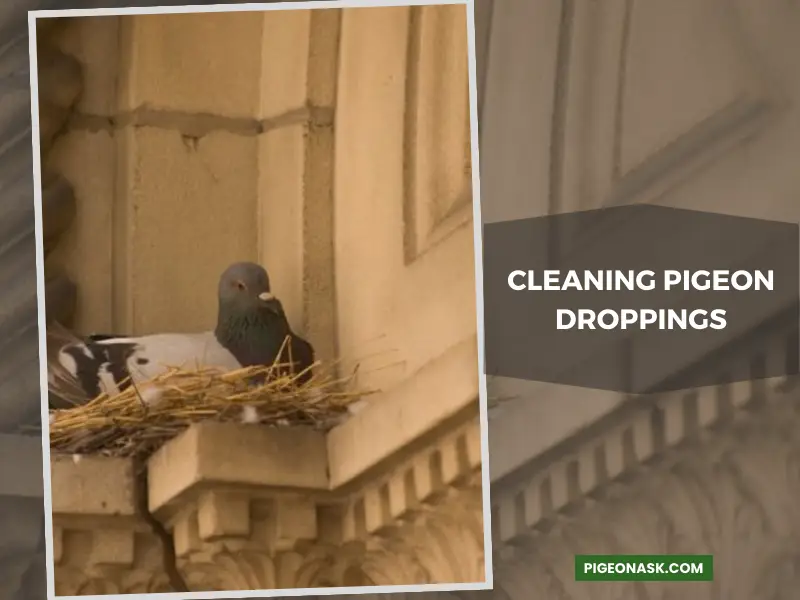
For stubborn stains, apply a disinfectant or soapy water solution and scrub the area. You can also choose to add some baking soda to the soapy water solution.
Once the surface has been cleaned, rinse with clean water (a hose is best for this purpose). Ensure that all waste, including droppings and cleaning materials, is disposed of in sealed bags.
After finishing, wash your hands thoroughly with soap and water, as well as your clothes.
Conclusion
It’s not wise to encourage pigeons to lay eggs on your balcony. If the act is already done, wait till the eggs have hatched, and then take action to prevent this from happening again.
We’ve already told you what preventative measures you can take place to discourage pigeons from entering your balcony. Act on them, and you won’t be bothered with pigeon eggs again.
References
- https://www.nyc.gov/site/doh/health/health-topics/pigeon.page
- https://extension.missouri.edu/media/wysiwyg/Extensiondata/Pub/pdf/agguides/wildlife/g09448.pdf
